At 11.30am on Friday morning David Mohren took me aside and said: "The hotel can no longer guarantee your safety. We are losing staff. We will have to consider our own safety and whether we can keep things operating."
Mohren, the general manager of the Radisson Blu in Kyiv, had, along with his staff, performed heroics as Russian missiles rained down on the capital in the early hours of the morning, repeatedly marshalling dozens of journalists, staff and locals into the basement two floors below reception.
Some 31 hours earlier, at 4.30am on Thursday, I had woken in the Radisson to the news that Europe's latest war had erupted.
Vladimir Putin had declared "special military operations" in a televised address at 3.39am. Missiles had already struck Kyiv Boryspil airport, loud explosions were reported in Odessa and Kharkiv and armoured Russian columns were moving across Ukraine’s borders.
At 5.09am the country’s foreign minister Dmytro Kuleba tweeted: "Peaceful Ukrainian skies are under strikes."
At that moment, I and other journalists had gathered, stunned and bleary-eyed, in the lobby. Mohren, who began his career in the group in Hannover in 2000 and who had run hotels in St Petersburg, Yekaterinburg and Donetsk, was on hand. Sandwiches and coffee would be provided.
Soon, however, staff were directing us to minus two, down stairwells and through labyrinthine corridors to a cavernous bunker that housed vehicles, IT servers, generators and noisy air conditioning hubs. It would become our intermittent refuge for the next days.
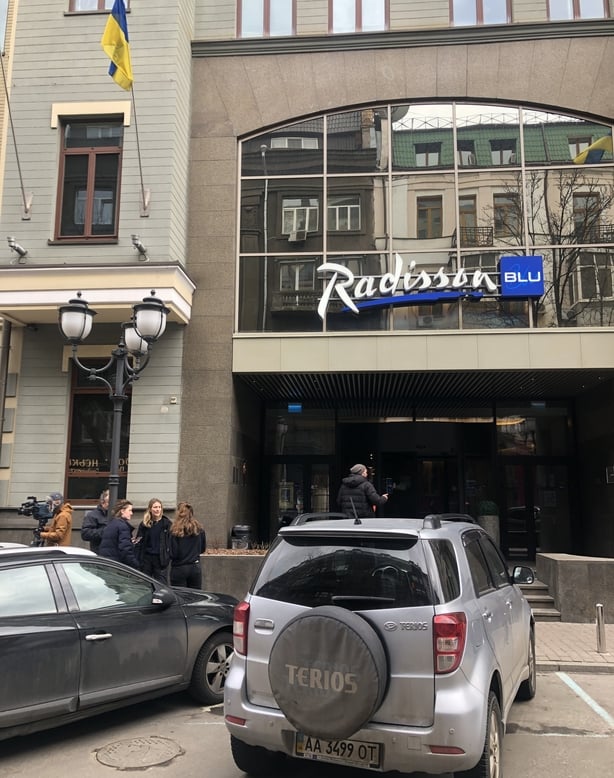
The world had waited for the invasion to happen. RTÉ News had been in Kyiv the previous week until Saturday 19 February. Bram Verbeke, RTÉ’s regular cameraman in Brussels, and I had returned on Wednesday via Warsaw on one of the few remaining flights into Ukraine.
Once the bombs began to fall in the early hours of Thursday however, all horizons changed. Our return flight was no longer a return flight. Ever present was the knife-edge sense that the longer we stayed to report on the war, the more difficult it would be to get out to safety.
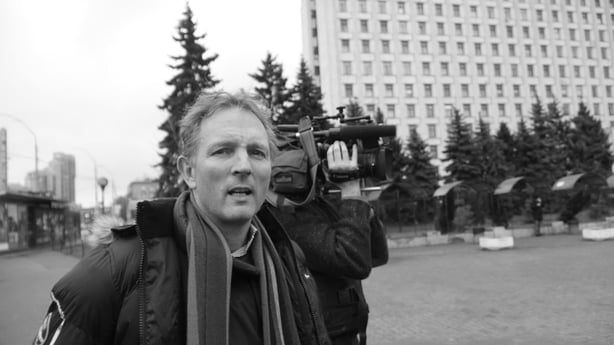
As the hours passed on Thursday morning it was clear a full-scale invasion was under way. How long would it take for Russian tanks to hit Kyiv? At what point does our personal safety eclipse the need to report the war?
While these mental conversations went on in the background, the day job continued. We emerged from the Radisson bunker, tentatively walking a number of blocks to see what was happening and to assess the mood.
There were people on the street, walking briskly, some dragging children and suitcases, many staring anxiously at their phones. Already a queue had formed at a cash machine.
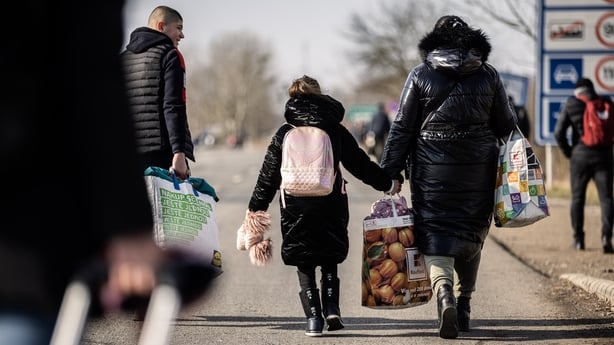
At the Golden Gate, the 11th century fortified entrance into Kyiv, an Italian-Ukrainian woman was frantically trying to reach her sister’s apartment having been woken at 5am by airstrikes where she lived near the airport.
"I called my sister and she said everything is ok and I said everything is not ok," she said.
A young couple from Azerbaijan were carrying backpacks and their cat in a travel box. "We still don’t know what’s happening. We know the airport is closed. We just got our passports at least to have our documents prepared," said the young man.
"We will meet with friends to decide whether it makes sense to go to the west or to get out of Kyiv at least to the suburbs," said his partner. "We still need to figure it out."
Like millions of other Ukrainians the couple had known they had to get things in order, but when the invasion actually happened they were still shocked and not fully prepared to become overnight refugees (it was too late for them now to fly back to Azerbaijan).
Now the instinct was just to move. "We didn’t have time to check the newspapers," said the man. "We’re just trying to get to the subway. Taxis - nothing works, we don’t have a car so we are just improvising."
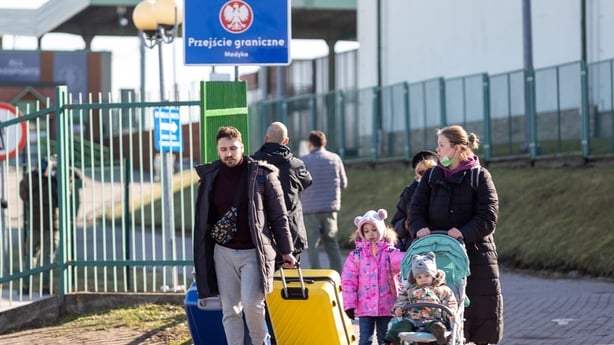
Another couple was struggling to get small children, suitcases, backpacks and soft toys into the car (the children were not exactly cooperating). "We're going to my mother's," said their mother. "In the west of Ukraine."
Back at the Radisson the bunker was being fitted out by staff. Chairs were being carried in, a coffee dispenser and huge casks of mineral water appeared. There was intermittent WiFi and power, meaning we could start editing our TV report for the One News.
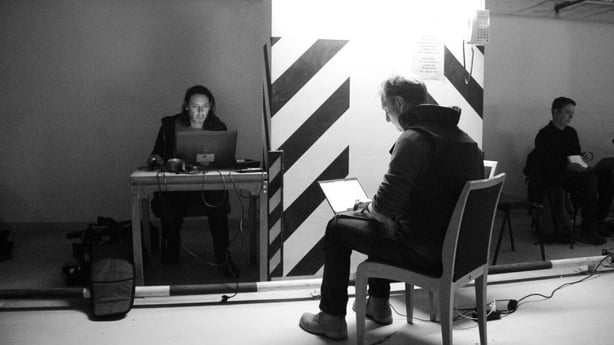
Dispatches were coming in thick and fast. Russian troops landing in Odessa, smoke rising from Ivano-Frankivsk Airport in western Ukraine, explosions at Ochakiv Port in the Mykolaiv region. A full scale invasion was under way. The government said five Russian helicopters had been shot down.
Journalists huddled around phones as President Volodymr Zelensky addressed the nation from a computer in his office.
As the day wore on, more and more people gathered in the bunker. There were couples with small children and pets.
As the invasion raged we were trying to figure out what our plans should be. RTÉ's Director of News Jon Williams and Foreign Editor Eimear Lowe had repeatedly told us our safety was paramount. If we need to leave we should leave and everything would be done to get us out.
The bunker provided one possible option. What if we stayed to keep reporting, even to the point that Kyiv fell to Russian tanks? We were safe in the bunker, there was power and connectivity. We could sortie when it was safe and keep reporting the story.
RTÉ had conveyed the Radisson’s coordinates (and our passport details) to the Russian ambassador in Dublin.
Experienced war correspondents in the bunker pondered the prospect that Russian forces who eventually might take control of the capital could well facilitate our departure at that point.
Alternatively, it made perfect sense to leave the capital to the safety of western Ukraine and keep reporting the conflict - and the burgeoning refugee crisis - from there. We had a driver - Artem Prokhach - who, as the afternoon wore on, urged that if we wanted to go we should do so immediately.
The roads out of the city were choked with traffic, as a river of motorised humanity headed west.
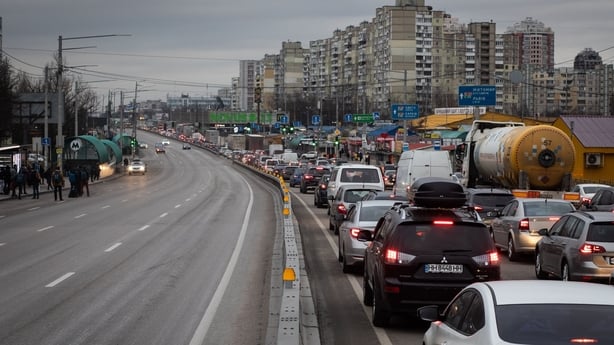
Yet, by the time we had filed our reports for the Six One News it was already 8pm local time. Russian forces were getting closer. There had been a fierce battle at the Antonov cargo airport at Hostomel, 15km to the west of Kyiv, not far from our main axis out.
Another option was to drive south towards Vinnytsia and then due west. Reports, however, were suggesting that journeys towards Lviv were taking 15, 18 hours. We would be driving at night with no power, into a conflict zone.
It was an agonising decision, but we erred on the side of staying put and reassessing on Friday morning.
That meant we could keep reporting from the bunker. We presented a live report into the Nine News on Thursday night from the street outside the Radisson (as a curfew was in place it was not wise to venture further). There were muffled airstrikes in the distance as the update began.
There were still plenty of journalists in the lobby. Colleagues from Norway had decided to sleep in the bunker. I was exhausted and needed a bed.
However, it was not the sleep I was hoping for. At 2am I was woken from a deep slumber by a phone call. Reception was calling every room to order people down to the bunker. Airstrikes were expected around 3am.
The bunker was already filled with people, by now more locals than journalists. The Radisson had provided duvets, pillows, even bean bags. Exhausted children slept on the concrete floors, seemingly oblivious to the latest violent upheavals on the European landmass.
I slept fitfully nearby, the muffled sound of airstrikes coming and going from far above. At 4.57am a Ukrainian online media, quoting intelligence sources, reported a Russian plan to force the government to sign a peace agreement and partition the country. At 5.33am it was reported that the Ukrainian military had blown up a bridge over the Teteris River 50km to the north of Kyiv in order to halt the Russian advance.
About the same time, cold and sore, I returned to the seventh floor, where I slept for another hour.
Back in the bunker, the Radisson staff had put on breakfast. It was not the four star buffet normally on offer, but was gratefully wolfed down by children, locals and media alike: porridge, cling-filmed sandwiches, some fruit and coffee.
Bram and I ventured out around 8.30am. The streets were emptier. Many had already fled. One couple, urging two small children up from the metro, stopped to tell us they had slept one minute at a time. "The children are okay," said the father. "The younger boy knows it’s a war. But he thinks it’s like a computer game."
Reports were continuing to pour in. The Russian military claimed it had destroyed 11 military airbases,13 command posts and communication centers, and 13 Ukrainian S-300 air defence systems. The government said 137 people had been killed.
There were clashes near the government quarter of Kyiv, perhaps 25 minutes walk from our hotel. Russian tanks were spotted in the suburbs. The Kremlin’s special forces were said to already be in the capital.
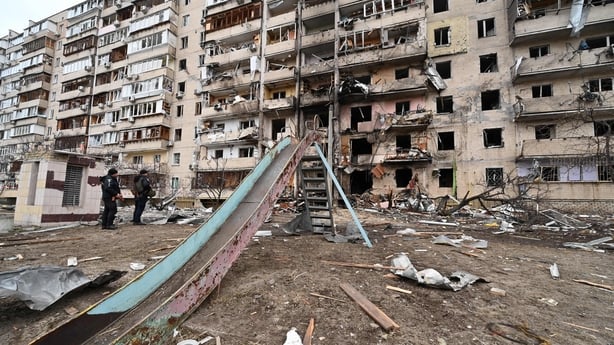
Michael Weiss, a respected author and journalist, quoting intelligence sources (with, he stressed, the usual caveats), had described in a Twitter thread, posted at 6.25am, how Ukraine expected Russia to capture Kyiv.
Some 2,000 Russian special forces would seize the airport and land 10,000 paratroopers, IL-76 aircraft, light armoured vehicles and airborne troops brought in by A-50 aircraft via Belarus.
"Simultaneously, sabotage groups already in Ukraine will seek to take out power grids and substations to disconnect much of Kyiv from electricity and communications, causing panic among the population," said Weiss.
"The task of the landing party is to block Kyiv, communications, military control channels, capture/blow up arsenals, and sow panic. The Russians want to create conditions for 'uncontrolled columns of refugees' from Kyiv, which will block highways and roads."
In the fog of war, and the furious battles being played out on social media, this could either be a fabrication, an exaggeration or perfectly true. The tanks were already in the suburbs, Ukrainian irregulars were ruthlessly seeking out saboteurs.
In these circumstances, staying put in the Radisson bunker and relying on the tender mercies of Russian troops, if and when Kyiv fell, seemed a less attractive option.
On a purely logistical basis, an obvious power and communications black out would make filing reports for RTÉ News impossible. Food was already running out in the hotel.
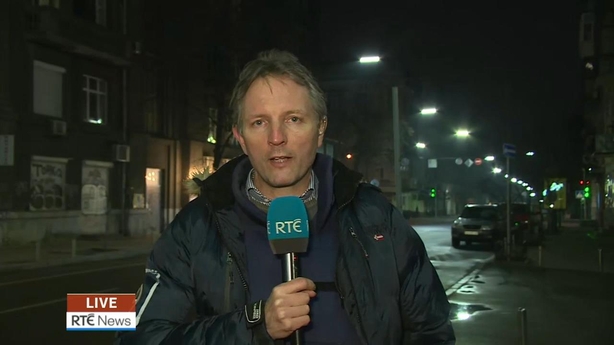
At that moment, around 11am on Friday, the endless deliberation about staying or getting out of Kyiv seemed to resolve itself.
We would leave.
However, there was another problem. Was it safe? The main westerly route, out the E40, was surely riskier now that Russian tanks were in the suburbs.
Two colleagues from the Belgian station VTM were keen to join us if we were leaving this morning. However, they had been told by the Belgian ambassador that the routes west and south were no longer safe. The Belgian embassy advised people to stay put in Kyiv.
This was confirmed by another journalist on a Signal chat group of foreign correspondents. "News from the Belgian embassy. Stay in Kyiv. The road to Lviv and South are dangerous with explosives and damages," he wrote.
With each minute that passed the window for getting out narrowed.
This was going to be a very tough call.
Then I saw David Mohren, the tireless Radisson manager in the lobby. What should we do, I asked?
His response was blunt and pivotal. Rather than the hotel remaining a last hold out for journalists who could keep reporting the situation, it now looked like a declining asset.
"We need to think of getting ourselves out," said David gravely. It was clear that the heroic operation to keep it going was on borrowed time. He was running out of staff, and, presumably, resources.
That was it. We would leave.
Then, unbelievably, another hitch. When I told Artem, the driver, we needed to go immediately, he blanched. We should have left last night, he said.
What’s more, now that we were leaving he wanted to bring his 16-year-old son. That would overload the car: including the two VTM journalists, we were already five, with luggage, flak jackets and helmets. If Artem brought his son, we were in trouble.
There were animated conversations between the pair. The 16-year-old was having none of it. He wanted to stay in Kyiv. The minutes squeezed past.
Eventually, Artem said: "Ok, we go".
Nine hours later we arrived in Rivne, a city in the west of Ukraine, some three-and-a-half hours from Lviv. As we checked in, exhausted, the air raid siren sounded, and we were ushered down to the basement. Our new bunker.







